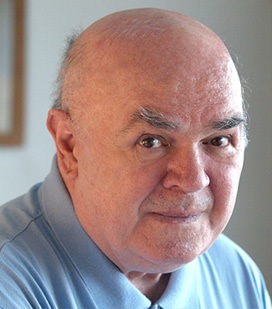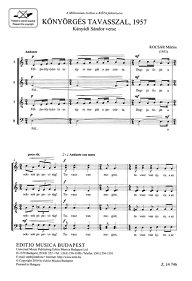The journey of musical works from author to performer
The task of the music publisher is to put manuscripts (be they paper or computerised) into a form that is legible, inspiring, and easy to use for performers; and to ensure the promotion, distribution, and legal use of the works.
With 75 years of experience behind us, we do this honourable work with consideration, commitment, and enthusiasm.
We thank the composers and music teachers who entrust their works to us.
Kocsár, Miklós

Miklós Kocsár was born in Debrecen on December 21, 1933. In his childhood he began to play the piano, but he pursued regular music studies only later, at the Debrecen Conservatoire, as a pupil of Emil Szabó. From 1954–59 he studied composition with Ferenc Farkas at the Ferenc Liszt Academy of Music, Budapest. At the beginning of the following decade, he married the choir conductor and music teacher Ildikó Herboly, a prominent exponent of the Kodály method.
His career began with chamber music, especially music for wind instruments. He wrote songs, cantatas, masses, oratorios, orchestral pieces and solo instrumental pieces, but a very considerable proportion of his œuvre consists of choral compositions. His works are sung worldwide; he is a celebrated composer for choirs, guest of honour at choir competitions. Many of his choral pieces were composed to verses by Hungarian poets; at different periods of his life the works of different poets have occupied his attention. He composed his works for children's choir to verses by Sándor Weöres; in his pieces for female and mixed choirs he has used verses by Gyula Juhász, László Nagy, Imre Csanádi and Sándor Kányádi, among others. Characteristic features of his compositions are his quest for beauty of sound and his insistence on strict formal proportions.
From 1963 Kocsár worked for a short time as an editor for the Music Publishing House, then from the autumn of that year until 1972 he was musical director and conductor at the Madách Theatre. Since 1972 he has taught composition at the Béla Bartók Music Conservatoire in Budapest. From 1974 until 1983 he was head of the folk music section of Hungarian Radio, then until 1995 he worked as deputy head of their General Department of Music. In recognition of his achievements as a composer, in 1973 and in 1980 he was awarded the Erkel Prize, in 1987 the title of Artist of Merit, in 1992 the Bartók–Pásztory Award, in 1999 the Prize for Hungarian Art, in 2000 the Kossuth Prize, in 2004 the KÓTA Prize, and in 2005 the Kölcsey Memorial Plaquette, in 2014 Artist of the Nation. He died August 29, 2019, in Budapest.
 Deutsch
Deutsch English
English Español
Español Français
Français Magyar
Magyar Română
Română Slovenský
Slovenský Slovenščina
Slovenščina 中文
中文






























































































